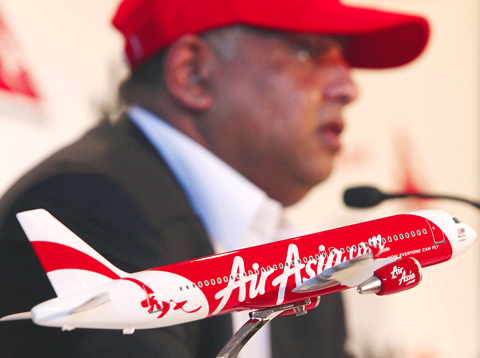Malaysia’s AirAsia and Australia-based Jetstar announced an alliance to help the budget carriers reduce costs, including cooperation on passenger handling at airports in Asia and possible joint purchases of aircraft.
Key to the agreement signed in Sydney yesterday is a proposed joint specification for the next generation of narrow body aircraft, the airlines said in a statement.
The airlines, among the biggest low cost carriers in Asia, will consider buying aircraft together so that bigger orders lower the cost per plane.

PHOTO: REUTERS
Jetstar, a unit of Australian flag carrier Qantas Airways Ltd, and AirAsia will also share aircraft parts and cooperate on passenger handling at airports in Australia and Asia.
Airlines are under pressure to find new ways to reduce costs as demand for travel remains weak despite some signs of recovery from the global recession. The International Air Transport Association forecasts the global airline industry’s losses to reach US$5.6 billion this year after an estimated US$11 billion of losses last year.
AirAsia, however, made a profit in the third quarter of last year — its most recently released result — as travelers traded down to budget airlines. Qantas has said it returned to profit in the second half of last year after a loss in the first half.
Qantas Airways chief executive Alan Joyce said Jetstar and AirAsia would gain a natural advantage in one of the world’s most competitive aviation markets through the alliance.
“Jetstar and AirAsia offer unmatched reach in the Asia-Pacific region ... and this new alliance will enable them to maximize that scale,” Joyce said in a statement.
AirAsia chief executive Tony Fernandes described the agreement as a logical development.
“AirAsia strongly believes the strategic tie-up will help the airline maintain its position as the lowest-cost airline in the world despite rising costs associated with the fledgling global economic recovery,” Fernandes said in the statement.
IG Markets research analyst Ben Potter said the alliance was “very positive” given the extremely competitive airline industry and the pressures under which carriers operated.

Nvidia Corp yesterday unveiled its new high-speed interconnect technology, NVLink Fusion, with Taiwanese application-specific IC (ASIC) designers Alchip Technologies Ltd (世芯) and MediaTek Inc (聯發科) among the first to adopt the technology to help build semi-custom artificial intelligence (AI) infrastructure for hyperscalers. Nvidia has opened its technology to outside users, as hyperscalers and cloud service providers are building their own cost-effective AI chips, or accelerators, used in AI servers by leveraging ASIC firms’ designing capabilities to reduce their dependence on Nvidia. Previously, NVLink technology was only available for Nvidia’s own AI platform. “NVLink Fusion opens Nvidia’s AI platform and rich ecosystem for

WARNING: From Jan. 1 last year to the end of last month, 89 Taiwanese have gone missing or been detained in China, the MAC said, urging people to carefully consider travel to China Lax enforcement had made virtually moot regulations banning civil servants from making unauthorized visits to China, the Control Yuan said yesterday. Several agencies allowed personnel to travel to China after they submitted explanations for the trip written using artificial intelligence or provided no reason at all, the Control Yuan said in a statement, following an investigation headed by Control Yuan member Lin Wen-cheng (林文程). The probe identified 318 civil servants who traveled to China without permission in the past 10 years, but the true number could be close to 1,000, the Control Yuan said. The public employees investigated were not engaged in national

CAUSE AND EFFECT: China’s policies prompted the US to increase its presence in the Indo-Pacific, and Beijing should consider if this outcome is in its best interests, Lai said China has been escalating its military and political pressure on Taiwan for many years, but should reflect on this strategy and think about what is really in its best interest, President William Lai (賴清德) said. Lai made the remark in a YouTube interview with Mindi World News that was broadcast on Saturday, ahead of the first anniversary of his presidential inauguration tomorrow. The US has clearly stated that China is its biggest challenge and threat, with US President Donald Trump and US Secretary of Defense Pete Hegseth repeatedly saying that the US should increase its forces in the Indo-Pacific region

ALL TOGETHER: Only by including Taiwan can the WHA fully exemplify its commitment to ‘One World for Health,’ the representative offices of eight nations in Taiwan said The representative offices in Taiwan of eight nations yesterday issued a joint statement reiterating their support for Taiwan’s meaningful engagement with the WHO and for Taipei’s participation as an observer at the World Health Assembly (WHA). The joint statement came as Taiwan has not received an invitation to this year’s WHA, which started yesterday and runs until Tuesday next week. This year’s meeting of the decisionmaking body of the WHO in Geneva, Switzerland, would be the ninth consecutive year Taiwan has been excluded. The eight offices, which reaffirmed their support for Taiwan, are the British Office Taipei, the Australian Office Taipei, the